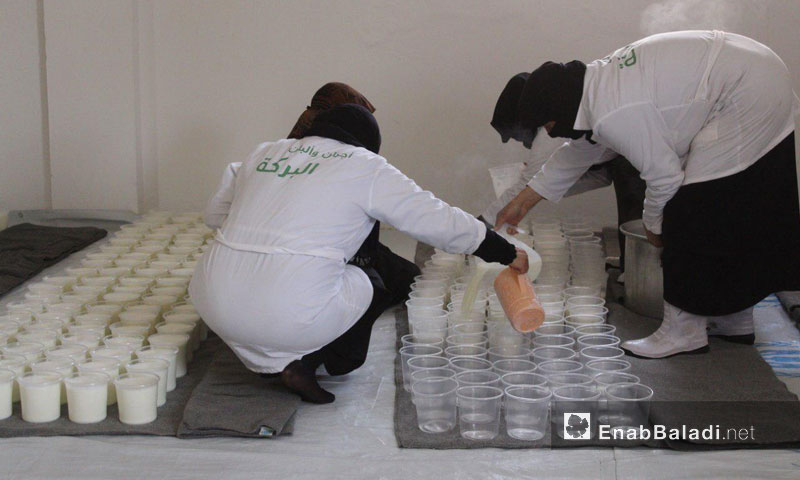A few years ago, Um Ali lost her husband and to live she depended on “aid offered by charitable people,” as she described them. The case was thus, until she enrolled in the “Livelihoods” Project, and started to make her own living.
Early 2018, “Ihsan Relief and Development” Organization opened two centers for dairy products in the northern countryside of Homs; both are run by women, who lost their male providers, in the shadow of the rare job opportunities in the area.
“I work to make living for my family,” Um Ali tells Enab Baladi, stressing that these projects are crucial, for they support, empower and help women live under the deteriorating financial situation; she also says that they most include more women who have lost their husbands.
The Project is categorized under the “Food Security and Livelihoods” Program, according to Abdul Malek Kakhia, the Director of the Dairy Production Program in Northern Homs, seeking to empower rural women and offer job opportunities to those who lost their husbands, targeting “those most in need”.
Food and Agriculture Organization (FAO) has warned against the declining national food security in Syria, in a report issued in mid-March, pointing out that the loss in the agricultural sector reached 16 billion dollars since 2011 to 2016.
Lawyer Iyad al-Bakour, informed of labor and trade affairs in the Northern countryside of Homs, explained that unemployment is prevailing in the area, hitting high records, following the cession of trade transactions.
He told Enab Baladi that the area’s people who work in the field of agriculture constitute 30% of the total population, self-employed and people active in the field of trade form 10%, while more than 60% is unemployed.
The Project’s Director Abdul Malek Kakhia explained that the centers supply the local market with dairy products, as to contribute to the stabilization of these products’ prices.
The Project was implemented in multiple phases in cooperation with the area’s local councils, according to Kakhia, who points out that the organization has chosen a building and restored it to guarantee the continuity of the centers after the Project’s funding stops at the end of March; it also prepared the building with the equipment and devices needed for sustainability.
Two governance committees for each center were formed, nominated by the local councils and the Homs’ Women Union, to run the centers during production and marketing stages and to supervise it administratively and financially.
In the meantime, each center is supplied with 1200 kilograms of milk on a daily basis. The estimated amount of daily production is about a thousand yogurt cans, half the returns of which are distributed on the centers’ women workers.
The “Livelihoods” Program focuses on tow major tracks, relief and early development. The Organization estimates the number of the beneficiaries, it managed to reach with more than 3.5 million persons, since its establishment in September 2013.
“Ihsan” Organization runs similar projects in Idlib and Daraa and has offices in Homs, Aleppo and rural Damascus.
Um Wael from the city of al-Rastan, a wife to a detainee and a mother to six children, enrolled in the project and started working. “I receive a sufficient salary that is enough for me and my children. I no more need anyone’s help,” she said.

